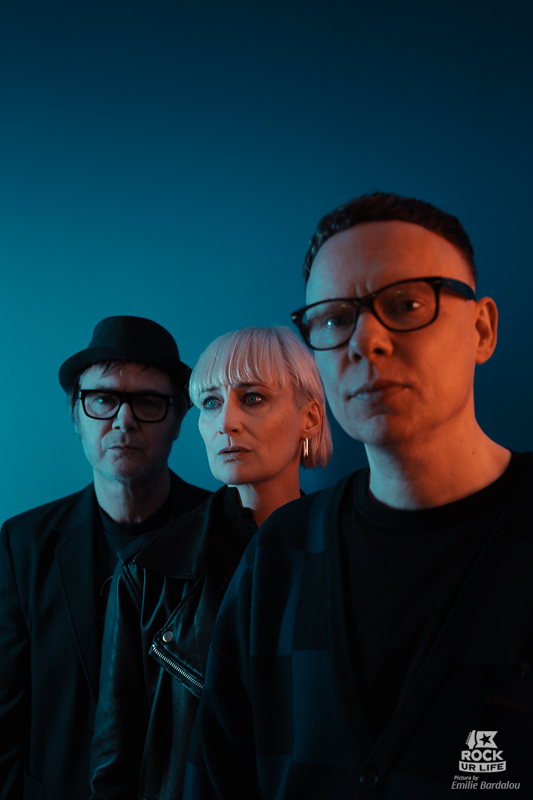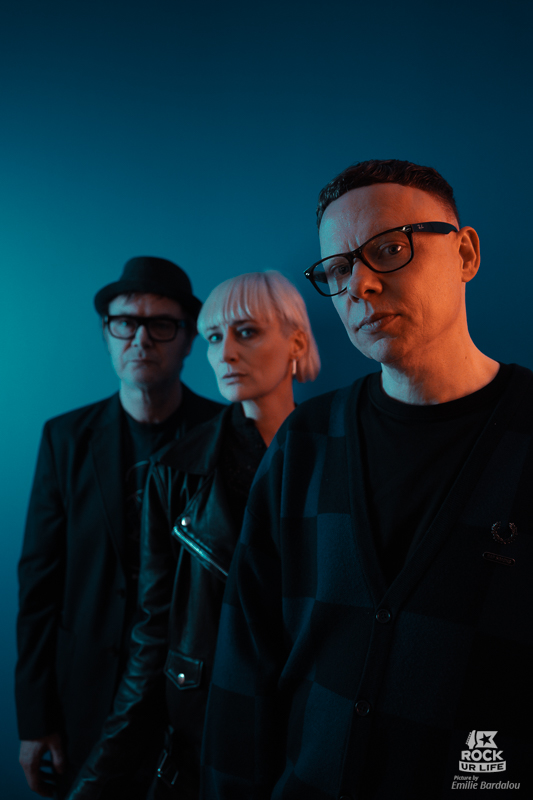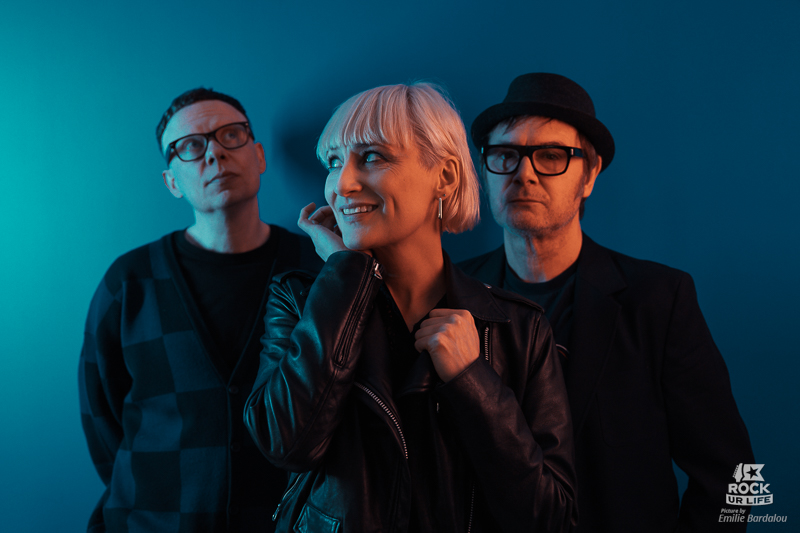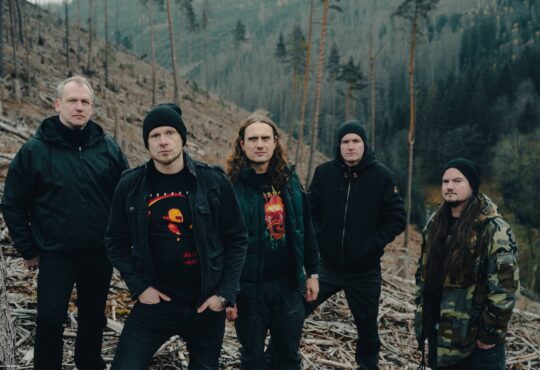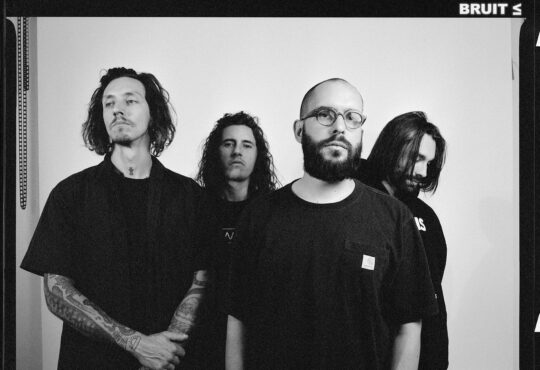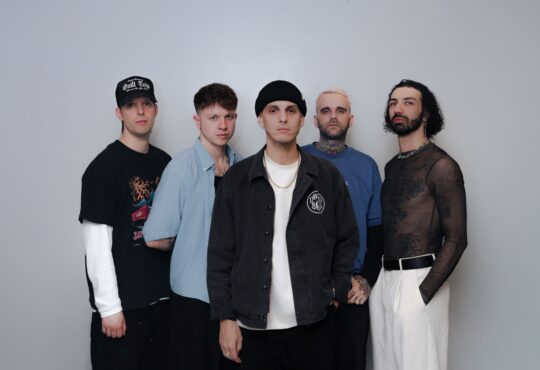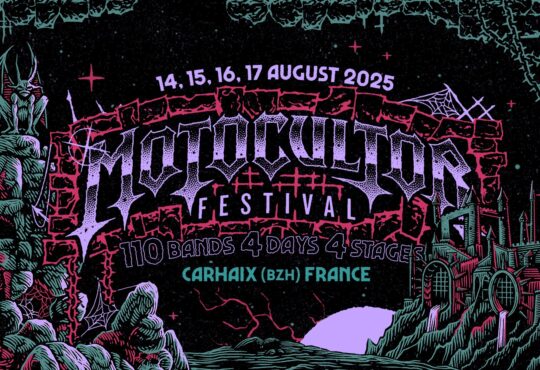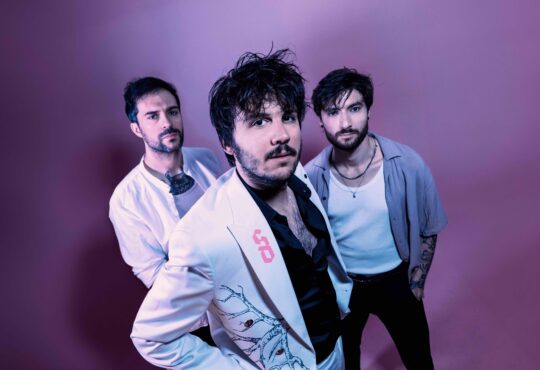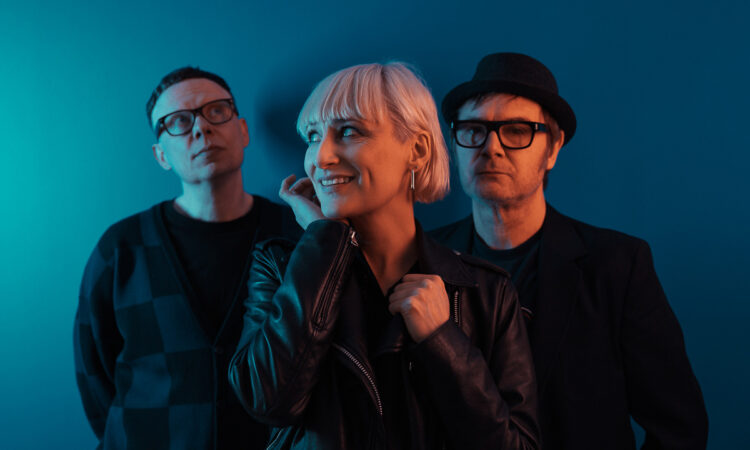
Just the day before their gig at Alhambra in Paris, RockUrLife sat down with Hooverphonic and in particular its effusive mastermind Alex Callier to talk about genre, touring, artificial intelligence and more importantly about their new album Fake Is The New Dope released on March 23th.
Hello guys! So your new album Fake Is The New Dope just came out. Are you satisfied with the feedbacks so far?
Geike Arnaert (vocals): Very positive, yeah.
Alex Callier (bass, main composer): Yeah, all the reviews in Belgium are really good. So we’re very happy, actually. Even after after all these years, it’s still kind of very kind of exciting to release an album. But also scary, you know. I always compare it to having your kid going to school for the first time. It’s like you just released something that you really worked on really hard, and then you just have to wait and see what happens. But so far yeah, it’s been really good.
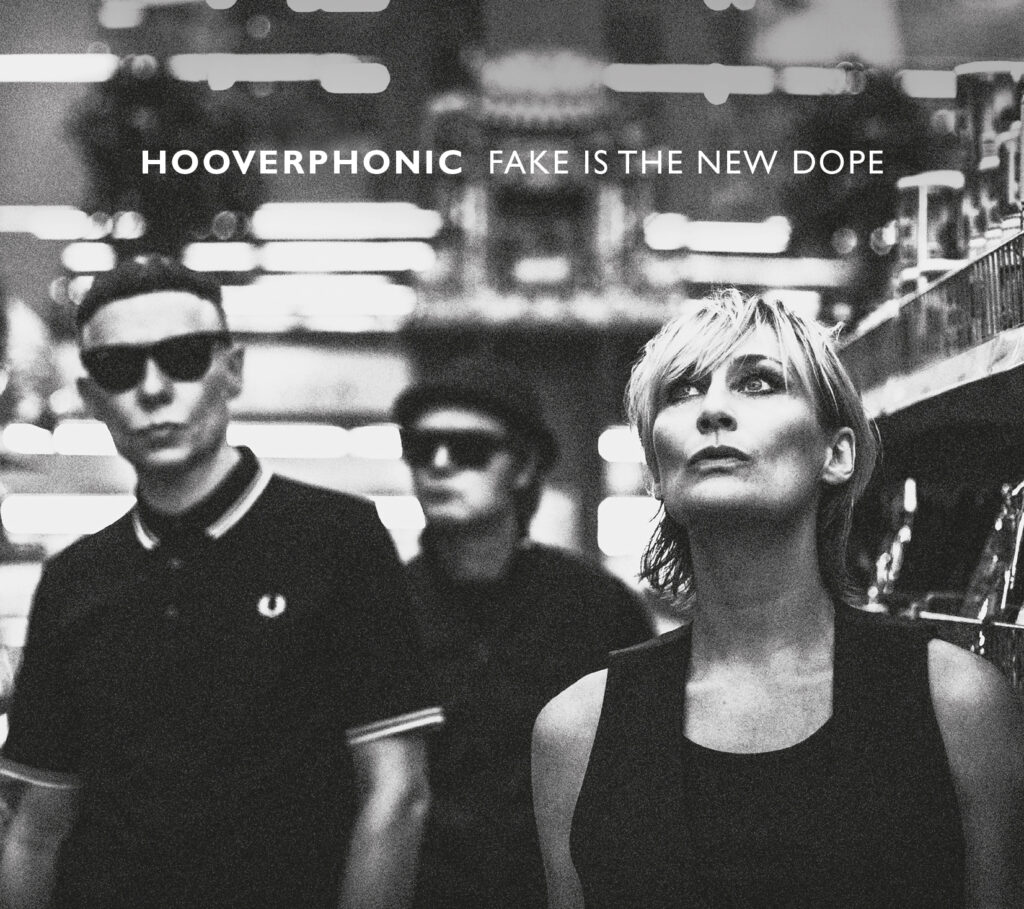
Is bad reception something you are afraid of?
Alex: I don’t think there is bad reception. Sometimes people understand what you’re doing, and maybe sometimes they don’t. In the end, it’s all very subjective. It’s also being in sync with the time or being in sync with what surrounds you. I think this album works really well because we’re in sync with what’s happening now. You know, there’s 90’s influences [on the album] and nowadays the 90’s are everywhere. But for us of course it’s very natural because we started in the 90s. So which is dangerous as well because sometimes they could say: “But you’ve already done that“. So you have to reinvent yourself and you have to reinvent your roots and kind of reinterpret it in a contemporary way.
Right, and as it happens: how do you find that inspiration to always renew yourself?
Alex: It’s just…. [sighs] who we are. I just don’t like to do the same thing all the time, you know? I was always more inspired by Gainsbourg or by David Bowie than by Neil Young, although Neil Young made some fantastic records. But after all these years, you know, Neil Young is still making that same record. The cool thing about Gainsbourg was… He knew his voice was like a very beautiful design chair. And even a beautiful design chair, after a while, you can get fed up with. So he was always smart enough to completely redecorate the room around his voice. And so every time you rediscovered that chair in a different environment and you thought: “Oh, this is interesting“, “oh, this is kind of cool“. Like how he first started as a chansonnier (ed: singer, said in French), then he became a pop artist. Then he was doing reggae then working with jazz musicians. And then he died. (laughs) And with Bowie it was the same. And you know,sometimes you like what they’re doing, sometimes maybe less. I actually quite like almost everything [Gainsbourg] did. But with David Bowie, maybe the drum ‘n’ bass is outdated now, I still think it’s really cool that he did that. It proves he has guts, to change and to dare to experiment. Because in the end that’s what pop music should be about.
You’re talking about Serge Gainsbourg actually, you do a cover of “Le Temps Qui Court” from Alain Chamfort on your tour, but not of Gainsbourg. Why?
Alex: We do a little Gainsbourg! We start a Hooverphonic song with “Bonnie And Clyde” and then we smoothly go into the song. But yeah, why not Gainsbourg?
Raymond Geerts (guitar): We did “La Horse” (ed. from the movie’s soundtrack of the same name) once.
Alex: Yeah in 2012 we did “La Horse”. And there’s still people asking: “Why don’t you play “La Horse” again?” I don’t know, why didn’t we do it? Maybe we should on the next tour. For the Alain Chamfort cover, I just liked the fact that he rewrote the lyrics of a Barry Manilow song, which was a very cheesy love song. And it’s just very good lyrics, I think. It’s a beautiful melody. It’s a little bit like Gainsbourg, also nicked from Chopin, Gainsbourg did that as well. And it’s also a song we know from our childhood, I believe.
Raymond: Yeah and I don’t know. Doing Gainsbourg would be maybe a little too obvious. You know what I mean? People would be like: “Yeah, of course, that again, of course they do it”. But nobody expects us to do a Barry Manilow song. So that’s more surprising. People don’t expect that from us. And that’s what we like to do a lot of times, I think.
What do you think people expect from you?
Alex: They expect us to play trip hop, but we already stopped playing trip hop a long time ago. (laughs) Even on our first record we didn’t play that. We had one or two songs that were inspired by trip hop, but there was a lot of shoegaze and dream pop influences in our music, actually. More than than the trip hop. There was more Cocteau Twins and Slowdive and My Bloody Valentine influences. But like I said earlier, we just like to evolve and every time we try quite different directions. And at some point we even became like a chamber pop band, like The Divine Comedy. I think the way we see it is like every album is sort of a soundtrack to a movie, and it’s always a different movie. We’re always writing for a different movie. So now it’s a bit more electronic. It’s a bit more 90’s, 80’s inspired but maybe the next record is going to be completely 50’s inspired or 30’s. On our new tour for example we start in a completely 30’s, 40’s cabaret style. We just love all kinds of music, we’re not restricted to one genre. If you would see our collection, it’s very eclectic. I also think it’s more interesting if I’m going to a concert as well. I like when there’s movement, when sometimes it’s happy, sometimes it’s really sad, sometimes it’s powerful, sometimes it’s very intimate. There’s so many emotions in life. Why would you restrict yourself to one?
That’s interesting because listening to the new record, there are some songs that make you think: “Yeah okay, that’s trip hop“.
Alex: Oh, yeah, “The United States Of Amnesia” is definitely trip hop. “Fake Is The New Dope”, the title track is influenced by trip hop.
One of the questions we had was actually asking you if you thought Hooverphonic fit in that box, but clearly you don’t think so entirely.
Alex Callier: No, not completely, because if you listen to the record, a song like “And Then I Found You” is influenced by club music and Everything But The Girl and that sort of stuff. “Fake Is The New Dope” and “The Best Day Of Our Life” are classic Hooverphonic songs. But the second one is more of a 60’s psychedelic vibe whereas “Fake Is The New Dope” more in a kind of dark, melancholic vibe. I think every song on the record is in an universe on its own. Of course “I’m Not The Girl To Kill” is also classic Hooverphonic, with a lot of James Bond influences. You know, we always try to have so many influences that it’s very difficult to pinpoint which influence it is.
Couldn’t the songs be a little too crowded with influences sometimes then?
Alex: Well, we don’t do it on purpose. It just happens. It’s something that. (ed. he snaps his fingers) We wrote, I think, 70 or 80 songs. I don’t know how many, but there were a lot. We wrote a ton of songs and the biggest challenge for us is always to choose, you know, to make a selection of all these songs. And whatever we choose it’s going to push the album in a certain direction. We could have made like a Beach Boys record, or we could have made more of an 80’s electro-pop record as well. But we chose not to because we felt that these songs had something in common. Although they were eclectic for us, they are a unity.
Listening to the record, there is sort of a pessimistic vibe around it, especially with “Fake Is The New Dope”. Could you tell me a bit more about what the lyrics of this track mean to you?
Alex: To me, it talks about the the balance. There’s a lot of stuff in our society that you can use to make things fake. Like we use Photoshop in photos, you can use autotune with somebody who can’t really sing to make him sing. I can’t sing, but I can pretend I can. And then with some autotune on it, it will sound okay. There’s nothing wrong with it, don’t get me wrong. There’s nothing wrong with Photoshop as long as it’s done in the right balance. It’s like with plastic surgery: if it’s subtle, it’s fine. But if it’s completely over the top, it becomes scary. And it’s also addictive. That’s why fake is the new dope. You say it’s pessimistic, but we don’t see it as pessimistic because there’s going to be a generation and they’re probably already there, the youngsters, they are already reacting against it. You see it in music : guitar is going back. And even perfectly tuned a guitar is never perfectly in tune. It’s always a bit off and that makes guitar music really cool. And at the end of the 80’s it was extremely plastic, all programmed, and so on. In the 90’s, suddenly you had grunge bands. And the thing about grunge was they didn’t use artificial stuff. And then you had Butch Vig who fucked up Nirvana. (laughs) He used tons of chorus, tons of reverb and tons of things that actually didn’t belong in it. It’s a great record, of course, don’t get me wrong, but it’s just me, it’s a producer thing.
There’s always a reaction to something and I think that maybe we should have put a question mark behind [the title of] Fake Is The New Dope. Well actually, no. I think it’s very easy to get addicted to that kind of stuff. For instance, I don’t use autotune because I don’t believe in “auto tune“. I believe in tuning a note, but I don’t believe in autotune because then everything gets tuned. It’s like a plugin. You put it on and it tunes it everything, but you don’t want that.
You could miss the little accidents that happen this way.
Alex: Yeah, exactly. So I always choose the notes which I want to change and which ones I want to leave like they are. And it’s the same with Photoshop : if you use it in a cool way, it can enhance the picture, it can enhance the emotion, it can make it better. But if you overdo it, it becomes plastic. And that’s why I can’t live in a plastic world. And as I said, with plastic surgery it’s also very sad because some people get addicted to it. They do one thing and then they do another and they keep on doing procedures. And it’s so addictive that they can’t stop. So that’s actually what the song is about. As long as you use it in a good way, there’s nothing wrong with it. But if you abuse it…
We are in the age of Artificial Intelligence (AI) programs now, it could be even worse.
Alex: I use AI. Of course I use AI. Mainly for technical stuff like EQ, compression, whatever. And I used it on another project where I made an AI plugin master the track and a proper sound engineer master it as well. And then I had people listen to it not knowing who did what. I just said, “A” or “B“, and they actually chose the AI version for that track. I don’t believe that master and sound engineers are losing their job. I think there’s always going to be a need for a good engineer. On the new material that I’m writing now I sometimes use ChatGPT just to get me started. But I have to say it only worked once. Most of the time it doesn’t work, because, in what we do, you need a lot of second degree layers. And I always miss those layers for some kind of reason. We did it for fun actually : if you ask “write me a Hooverphonic lyrics“. If you do that it becomes really dark, but the subtlety is gone. But to be honest, I think it’s there and it’s going to stay there. Like everything in life there’s going to be people doing fantastic stuff with it. There’s going to be people who are going to abuse it. It’s the same with the voice! You can now say something and have like… Thom Yorke sing it, and it sounds really like Thom Yorke. I would never use that. I couldn’t. I have too much respect for Thom Yorke. I couldn’t have him saying things like: “Oh baby, I love you, I want you, and I need you“, you know? I am quite respectful of other artists but I’m sure there are there are people around out there who are not going to be that respectful.
Right. So, changing the topic completely: we wanted to talk about the track “Por Favor” because, contrary to some other tracks on the record, is has a really optimistic, cheerful sound. It’s almost like a Manu Chao song in some ways. How did that come about?
Alex: I wrote it with Luca Chiaravalli. He’s been a songwriting friend of mine for a long time now. He has a heart condition, and during COVID he spent a lot of time locked up in the studio. He couldn’t go out because he is really fragile. And his parents are very old as well. He was just cutting up samples, to have fun. And he found these mariachi samples and when I heard that I said that I kind of liked it. Like you said, it also reminded me a bit of Manu Chao. But to be honest, the Spanish influence had already been there in our work. On 2002’s Hooverphonic Presents Jackie Cane, you have a song called “Day After Day” that’s even more Spanish. And from time to time we have that kind of influence in our work. I still remember back in the days when we toured for The Magnificent Tree, we had a bossa nova version of a song. I think it was “L’Odeur Animale”. My dad listened a lot of Latin music so that’s probably what triggered it. But it’s not only that I guess, it’s also the way the harmony, you know. It’s very difficult to explain, but harmony is very subjective. Like, I don’t like Mozart. A lot of people like Mozart, but I don’t like Mozart. Mozart, for me is too obvious. It’s genius. Yeah. Of course. But in its melodies it’s too obvious. I prefer Bach. I think Bach, melody wise and harmonically for me is more interesting. I prefer even more [Erik] Satie. I think Satie is, in classical music, the closest to what I think is interesting harmonically. That’s because he modulates all the time. He doesn’t stay in a key. It’s constantly shifting chromatically. And to go back to “Por Favor”, we just wrote it for fun, actually. Quite often I write a song and it’s just for fun. “Don’t Think” for example, we didn’t even think it would be a Hooverphonic song. But we’re always open minded, we always say: “Let’s try, let’s see what happens“. And then Geike sang it and it was actually really cool.
Earlier you said each album is its own kind of movie soundtrack. What images come up in your mind when you are writing an album?
Alex: [thinks] It’s always different. This time around that it feels it feels almost more like a coming of age story or something to me. I don’t know why. Probably not, nut for me, if I would make a movie about it, I think it would be some kind of… [cuts off] Yeah. The hurt that’s in there, kicking from my depression. But it’s also the kind of hurt you can feel when you’re young. I think.
You already did a soundtrack, as a solo artist, for the movie “Change”.
Alex: A long time ago! Really bad movie.
Well, we didn’t watch it. [laughs] But do composing a movie score as the band Hooverphonic could be an option? Is it tempting to you?
Alex: To be honest, I would love to do it but I only would like to do it with the right director. You know, making an album is the three of us. That’s easy. We listen to songs, we record songs, we talk about songs. We finally decide: “Okay, this is the selection“. But making a movie is : a producer, a director. The director is under the producer, most of the time he has more a say than the director. Then you have all the other guys and then at the end you have the musician. Like an afterthought: “Oh, yeah, we need a soundtrack“. So in a way you have to work with a team. And I believe it only works when you really are a good team, when you’re on the same wavelength. Only then I would love to do it, but to be honest, it’s also very, very nice to just be the three of us in the studio and just do whatever we want to do and decide where we want to go. I would love to do it. And I think at this point in our life, it would kind of be possible. I think now my skills as an arranger are way better than they used to be. But it’s something you don’t decide, it’s something people ask. So we’ll see what happens.
Let’s go back in time for a bit : in 2021 you entered the Eurovision contest. How did that came about?
Alex: We were in the wrong place. (laughs, referencing the song “The Wrong Place” with which they entered the contest). It was fun. It was just fun. Yeah, it was fun to be in “the wrong place“. It was also a very special edition because of COVID.
And it’s actually the second edition you participated in.
Alex: Yeah, the first one [2020] was canceled. We did really well on the online version.
Raymond: Yeah. We were at least in the top five.
Alex: Yeah. It was fun, you know. There is sun, there is fun, but the music sounds dull. It’s so weird to be here, you know? (ed. Alex quoted the first lyrics of “Fake Is The New Dope”) Where do you think the line comes from? (laughs) But at the same time there was also good music, I think. And what I like about it is that it’s so eclectic. In the 90’s it was kind of a circus. Then it became a bit better. And I have the feeling we’re going back now.
Now it’s a circus again?
Alex: It’s going in that direction, yeah, I feel.
Raymond: More and more. I don’t know for this year I didn’t really watch it.
Alex: Now the Dutch are going with…
Raymond: “Europapa”.
Alex: Yeah, “Europapa”. It’s 80’s-inspired. What was it called? Hardcore! Yeah, hardcore.
A revival of the Eurodance genre of sorts?
Geike:Eurodance, yeah, that’s it.
Alex: Yeah, yeah, but the really hardcore version of it like. (ed. he imitates the rhythm of a Eurodance track with beatboxing) Well, you know, it is what it is. And in the end it was just fun to do and to be honest, during COVID, at least we had something to do because there was not much else to do.
Would you do it again?
Alex: Depending on the song… I don’t know. Would do we do it again?
Geike: I mean, I was having a lot of fun. It wasn’t in my bucket list at all. I wasn’t going to be there but I enjoyed myself very much and remembering the night itself. I would want to be part of that circus again, because that’s what it was. It was really like a joyride.
Raymond: I think we would even stand out more now.
Geike: But musically, what is the challenge really?
Alex: It was the first and the last time we were in a competition, i think. The moment they have like a proper orchestra again and you have to bring your conductor. To be honest, yeah, no, we don’t want to go back. We it did it once. It was fun.
Raymond: Well, we did it twice. (laughs)
Talking about orchestra, you’re touring with a string quartet right now. What’s the process like for rearranging some of the songs to fit incorporate the quartet?
Alex: It’s actually quite easy. It’s, um, the setup we’re touring with now is ten people on stage. Le quatuor à cordes (ed: string quartet, said in French), two guitarists, keyboard player, bass player, drummer and Geike. That is the minimum you need to play Hooverphonic songs live without any computers on stage. If you really want to play it live and you don’t want no tapes or whatever, that is the minimum you need. And because it’s the minimum, it kind of makes it even more pure or something. It makes it even more straight in the face. To give you an example, we played with a big orchestra two years ago in 2022. We did like a couple of shows also with a big orchestra and my wife saw them, and because she never saw us with the string quartet, after the first show we did with it, she came backstage and said: “Whoa, it’s even more intense“. So she was quite amazed that it was more intense, but it’s because it’s not a big ensemble. Now it’s four extra people.
Raymond: It’s still a band feeling.
Alex: Yeah. This is actually how we always should play, but it’s expensive. It’s not easy in these times. And we do it for the art, you know, it’s not going to make us money, but at least it’s going to be beautiful. And on the last week dates I had a lot of people coming to me saying: “Whoa, man, I was crying during the show“. And I think that is one of the biggest compliments, when people are emotionally moved by. And with AI, I always say that for the moment, it’s not there. There’s not an AI song that’s going to move me, but I don’t dare to say that it’s never going to happen. Maybe there’s going to be one that’s going to emotionally get to me. And then you can ask yourself, is it a bad song if it gets to you emotionally? It’s actually doing what a song should do. I don’t know. I don’t have a, I don’t have like a crystal ball to look at it, you know. But for the moment I don’t see it happening. Look at what it does… As a joke. I made demos I changed my, my voice to those of Dave Gahan or Charlie Puth or whatever. Just for fun, you know. But sometimes it gets scary, it’s getting better and better. But on the other hand, what I also learned from doing that is that I don’t write music like Charlie Puth or Dave Gahan do. I don’t write the melodies they write. So even if you use their voice, my wife always says: “I still can hear you sing it because it’s you phrasing it“. So if Geike were to do it and I would change her voice, you would still hear her because the way she makes these vocal lines is hers. It’s like DNA. You can’t copy it.
About the singers, actually. You’ve had many singers in the past 30 years or so. Does that affect the way you write songs?
Alex: No, I don’t think so. I think the choice of the songs is different. I think the, the selection of the songs is different because I always write a lot. I always make a lot of demos and I think you select songs according to how they are sung or how they are interpreted or whatever. But also sometimes other silly things. For example, the song “Anger Never Dies”, we wrote it when Geike was still with us [before leaving the band in 2008], and we made a demo and we were all thinking: “yeah, it’s great, but it’s not there yet“. We didn’t use it. And then in 2010, Noémie [Wolfs] joined us. And at that point suddenly I thought: “I know what’s wrong: the tempo is wrong, it’s too slow“. I made it faster, Noémie sang it and suddenly it worked. It was always difficult for us when a singer left. But at the same time it also forced us to reinvent ourselves. We were forced to move in a direction. And with Noémie we became a bit more Divine Comedy inspired, a bit more chamber pop kind of band, which was good at that moment. It always kept us moving and experimenting and then Geike came back in 2020, which we were very happy with of course, and that made us move in a different direction.
To touch on that, Geike, when touring you’re drawing from a large repertoire of songs. How do you how do appropriate the tracks that have been sung by other singers originally?
Geike: Well, it depends. There’s a few songs that have different arrangements now, like “Gravity”. It is true that when what Alex writes it is maybe very personal, but that makes it very universal as well. So it’s evident that I can put my own story in there. Change it a little bit.
Alex: Even with “Romantic” now we play it in a different key and it changes the vibe, but in a good way, I think. The fantastic talent of Geike is that she can make all these songs her own. She has the imagination for it.
Geike: And then I’m not able to do what Luka [Cruysberghs, former singer] would do or anybody. And that’s not the point either. I’m not the best singer. Maybe, but that’s not the point.
It’s funny because on social media some people call you the “ultimate voice” of Hooverphonic.
Geike Arnaert: We grew together. Hooverphonic started with Esther [Lybeert] and Liesje [Sadonius]. But that also still the very beginning. And then I came. I came in the band almost as a child as well. They were 25, I was turning 18 that year. And then all of a sudden things got big in that era.
Alex: We were on tour for eleven years. We were touring the whole time. So we build Hooverphonic. And of course we had a lot of success as well with Noémie. But there was never the same connection.
It’s as if you were childhood friends almost. You grew up together as a band for so long so there’s a special connection.
Geike: Yeah. Maybe, yeah. There’s things you know about each other, that other people don’t.
Alex: I think, yeah… It’s just a chemical thing, you know.
Geike: But then again, I left with good reason. And I can say that I wasn’t afraid for them either. I mean, they do what they do. I was also very happy to see that they were getting a new identity as well, because you were following big change with a new… élan (ed: momentum, said in French). And that was beautiful.
Alex: We always saw it as Geike leaving but at some point she might come back. And when the moment was there, when we all had taken enough steps back, then it finally happened. It’s also the only time in our career that we had to of tell a singer that she had to go. Most of the time it wasn’t like that at all. But for us, it was obvious.
Our time together is almost up, we have one last question for you three. It’s a bit of a ritual of ours, you know, we are RockUrLife so… What rocks your life?
Alex: What rocks my life? What rocks my life? (ed. he ponders) Tea.
Tea? Why is that?
Alex: Because that’s the only thing I’m addicted to in my life. After 30 years of rock’n’roll, the only addiction I have is tea. If I don’t have tea, I’m not happy. I need my tea to be happy.
Geike: Well, for me… I would say learning… For you guys (ed. pointing at Alex and Raymond), music is obviously on top as well. But my instrument is my voice and my body and learning about it and discovering, it’s just… It’s not that I’m in love with my own voice because I’m very critical of it but realizing what it can do and finding out new things. I mean, it’s never new [laughs]. It’s like in the movie Spotless Mind, it’s like I always discover everything again and again and I love it. What’s the film called? Eternal Sunshine Of The Spotless Mind. It’s like that.
Raymond: I could say cigarettes, but I’m not gonna. You were talking about addiction. Well, I’m addicted to cigarettes. No, well, i could say Hooverphonic. That rocks me. For the last thirty years. No, really I mean it, we have quite a history. Like a bumpy road. And still we are here, so it means something that we always survive things and that wasn’t easy. So for me, that’s really rocking my world because it’s that’s my world in fact. So that’s about it.
Alex: To add on that, hearing people saying that they were emotionally touched by our music. Like last year we were touring on the Ukrainian border, we did gigs in Romania, in Serbia. And there was this Ukrainian girl who had to flee away from the war, and she was staying in Bucharest. And she and she said to us: “You know, your music helps me through these dark times“. That is something special. The danger of being a musician, we’re doing this for almost thirty years, is that you could start taking it for granted. It’s special and you should never forget that.
Website: hooverphonic.com



